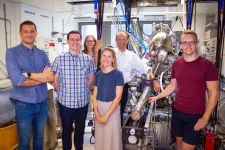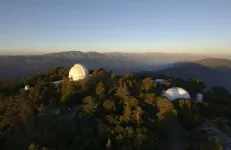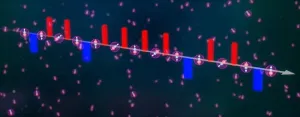(Press-News.org) Of the first five U.S. states to implement food waste bans, only Massachusetts was successful at diverting waste away from landfills and incinerators, according to a new study from the University of California Rady School of Management.
The paper, published today in Science, suggests a need to reevaluate current strategies, citing Massachusetts' approach as a benchmark for effective policy implementation.
Between 2014 and 2024, nine U.S. states made it unlawful for commercial waste generators—such as grocery chains—to dispose of their food waste in landfills, expecting a 10–15% waste reduction.
“We can say with high confidence that the combination of waste bans did not reduce landfilled waste by more than 3%, and that is including Massachusetts, which successfully reduced landfilled waste by 7%—gradually achieving a 13.2% reduction,” said Robert Evan Sanders, assistant professor of marketing at the Rady School of Management and coauthor of the paper. “Essentially, the data suggest that in four out of the five states we studied, these laws did nothing to reduce waste.”
Fiorentia Anglou, coauthor of the paper, who conducted the research while earning a PhD at the University of Texas at Austin’s McCombs School of Business added, “With food waste around the globe contributing 8 to 10% of greenhouse gas emissions, we certainly don’t think states should abandon these laws, but more action needs to be taken to make them effective.”
The authors of the paper compiled a comprehensive waste dataset covering 36 U.S. states between 1996 and 2019 to evaluate the first five implemented at the state level: California, Connecticut, Rhode Island, Vermont, and Massachusetts.
The researchers point to three distinctive features in the Massachusetts food waste ban law that when combined, likely help make it effective. They include:
Best composting infrastructure network. The state has the most food waste processing facilities per every 1,000 square miles in the state.
The simplest language: The law in Massachusetts is the easiest to understand, with the least number of exceptions and exemptions.
Enforcement: Massachusetts had more than triple the number of inspections per generator per year than the next nearest state, Vermont. And there was almost no enforcement—either in inspections or fines—in the other states.
The authors used a variant of the synthetic control method, which is used by economists and data scientists to evaluate government policy changes. The authors compared each state that adopted the ban to similar states that did not implement a waste ban. And they were able to project how much waste would have gone to landfills had California, Connecticut, Rhode Island, Vermont and Massachusetts not implemented waste bans.
“With most of these laws, about 70% of commercial organic waste would have been illegal to send to landfills," said Ioannis Stamatopoulos, coauthor of the paper and associate professor at UT Austin’s McCombs School of Business. “If you take all that organic waste out of landfills, it should reduce the amount of waste that's going into landfills by 10% in some cases, and that should have been something we were able to see in the data but did not."
The researchers used data from environmental state agencies of in 36 states, covering the waste produced by 274 million Americans—or 85% of the U.S. population. Though some states provide the data on their websites, most of it was collected manually over the course of a year from public records requests and contacting state agencies.
“Our findings indicate that simply implementing a food waste ban is not enough to achieve significant reductions in landfill waste,” the authors note. "Massachusetts has shown that with the right combination of comprehensive coverage and effective enforcement, these bans can work. It's crucial for other states to learn from this model and adapt their policies accordingly to meet environmental targets and reduce greenhouse gas emissions.”
They added that California has taken a step in the right direction with the passage of SB 1383 in 2022, which requires every jurisdiction to provide organic waste collection services to all residents and businesses.
Read the full “Of the first five U.S. states with food waste bans, Massachusetts alone has reduced landfill waste” study.
END
New study reveals food waste bans ineffective in reducing landfill waste, except in Massachusetts
Researchers call for reassessment of current policies, most of which have little to no effect, contrary to policymakers' expectations
2024-09-12
ELSE PRESS RELEASES FROM THIS DATE:
New research reveals how El Nino caused the greatest ever mass extinction
2024-09-12
Mega ocean warming El Niño events were key in driving the largest extinction of life on planet Earth some 252 million years ago, according to new research.
The study, published today in Science and co-led by the University of Bristol and China University of Geosciences (Wuhan), has shed new light on why the effects of rapid climate change in the Permian-Triassic warming were so devastating for all forms of life in the sea and on land.
Scientists have long linked this mass extinction to vast volcanic eruptions in what is now Siberia. The resulting carbon dioxide emissions rapidly accelerated climate warming, resulting in widespread stagnation and the collapse ...
Climate-change-triggered landslide caused Earth to vibrate for nine days
2024-09-12
A landslide in a remote part of Greenland caused a mega-tsunami that sloshed back and forth across a fjord for nine days, generating vibrations throughout Earth, according to a new study involving UCL researchers.
The study, published in the journal Science, concluded that this movement of water was the cause of a mysterious, global seismic signal that lasted for nine days and puzzled seismologists in September 2023.
The initial event, not observed by human eye, was the collapse of a 1.2km-high mountain peak into the remote Dickson Fjord beneath, causing a backsplash of water 200 metres in the air, with a wave up to 110 metres high. This ...
Microbe dietary preferences influence the effectiveness of carbon sequestration in the deep ocean
2024-09-12
Woods Hole, Mass. (September 13, 2024) - The movement of carbon dioxide (CO2) from the surface of the ocean, where it is in active contact with the atmosphere, to the deep ocean, where it can be sequestered away for decades, centuries, or longer, depends on a number of seemingly small processes.
One of these key microscale processes is the dietary preferences of bacteria that feed on organic molecules called lipids, according to a journal article, "Microbial dietary preference and interactions affect the export of lipids to the deep ocean," published in Science.
"In ...
The insulator unraveled
2024-09-12
Aluminum oxide (Al2O3), also known as alumina, corundum, sapphire, or ruby, is one of the best insulators used in a wide range of applications: in electronic components, as a support material for catalysts, or as a chemically resistant ceramic, to name a few. Knowledge of the precise arrangement of the surface atoms is key to understanding how chemical reactions occur on this material, such as those in catalytic processes. Atoms inside the material follow a fixed arrangement, giving rise to the characteristic shapes ...
$3.5M grant to Georgia State will fuel space research across the globe
2024-09-12
ATLANTA — A new three-year, $3.5 million grant from the U.S. National Science Foundation will foster new research at Georgia State’s Center for High Angular Resolution Astronomy (CHARA) Array by astronomers from around the world.
The grant will fund open-access time at the CHARA Array through the NSF National Optical-Infrared Astronomy Research Laboratory (NSF NOIRLab). The program offers astronomers the opportunity to apply for observing time at the CHARA Array to investigate all kinds of objects ...
Polar molecules dance to the tunes of microwaves
2024-09-12
The interactions between quantum spins underlie some of the universe’s most interesting phenomena, such as superconductors and magnets. However, physicists have difficulty engineering controllable systems in the lab that replicate these interactions.
Now, in a recently published Nature paper, JILA and NIST Fellow and University of Colorado Boulder Physics Professor Jun Ye and his team, along with collaborators in Mikhail Lukin’s group at Harvard University, used periodic microwave pulses in a process known as Floquet engineering, to tune interactions between ultracold potassium-rubidium molecules in a system appropriate for studying fundamental magnetic ...
Quantum researchers cause controlled ‘wobble’ in the nucleus of a single atom
2024-09-12
Researchers from Delft University of Technology in The Netherlands have been able to initiate a controlled movement in the very heart of an atom. They caused the atomic nucleus to interact with one of the electrons in the outermost shells of the atom. This electron could be manipulated and read out through the needle of a scanning tunneling microscope. The research, published in Nature Communications today, offers prospects for storing quantum information inside the nucleus, where it is safe from external disturbances.
For weeks on end, the researchers studied a single titanium atom. “A Ti-47 atom, to be precise,” ...
Foods with low Nutri-Scores associated with an increased risk of cardiovascular diseases
2024-09-12
Cardiovascular diseases are the leading cause of mortality in Western Europe, accounting for 1/3 of deaths in 2019. Diet is thought to be responsible for around 30% of such deaths. Nutrition-related prevention policies therefore constitute a major public health challenge for these diseases.
In an article to be published on 11 September 2024 in Lancet Regional Health - Europe, researchers from the Nutritional Epidemiology Research Team (CRESS-EREN), with members from Inserm, Inrae, Cnam, Université Sorbonne Paris Nord and Université Paris ...
Research reveals reality of Ice Age teen puberty
2024-09-12
Landmark new research shows Ice Age teens from 25,000 years ago went through similar puberty stages as modern-day adolescents. In a study published today in the Journal of Human Evolution of the timing of puberty in Pleistocene teens, researchers are addressing a knowledge gap about how early humans grew up.
Found in the bones of 13 ancient humans between 10 and 20 years old is evidence of puberty stages. Co-led by University of Victoria (UVic) paleoanthropologist April Nowell, researchers found specific markers in the bones that allowed them to assess the progress of adolescence.
“By analyzing specific areas of the skeleton, we inferred things like menstruation ...
Use of biomarkers in the management of inflammatory bowel disease
2024-09-12
Inflammatory bowel disease (IBD), encompassing Crohn’s disease (CD) and ulcerative colitis (UC), is a chronic inflammatory disorder of the gastrointestinal (GI) tract that significantly impacts the quality of life of patients. With an incidence of approximately one in 200 individuals in developed countries and a rising trend in developing and newly industrialized nations, IBD poses a substantial burden on healthcare systems. Due to the nonspecific nature of its clinical manifestations and the lack of a gold-standard diagnostic test, managing IBD effectively remains a challenge. Therefore, reliable and widely available biomarkers ...
LAST 30 PRESS RELEASES:
New knowledge on heritability paves the way for better treatment of people with chronic inflammatory bowel disease
Under the Lens: Microbiologists Nicola Holden and Gil Domingue weigh in on the raw milk debate
Science reveals why you can’t resist a snack – even when you’re full
Kidney cancer study finds belzutifan plus pembrolizumab post-surgery helps patients at high risk for relapse stay cancer-free longer
Alkali cation effects in electrochemical carbon dioxide reduction
Test platforms for charging wireless cars now fit on a bench
$3 million NIH grant funds national study of Medicare Advantage’s benefit expansion into social supports
Amplified Sciences achieves CAP accreditation for cutting-edge diagnostic lab
Fred Hutch announces 12 recipients of the annual Harold M. Weintraub Graduate Student Award
Native forest litter helps rebuild soil life in post-mining landscapes
Mountain soils in arid regions may emit more greenhouse gas as climate shifts, new study finds
Pairing biochar with other soil amendments could unlock stronger gains in soil health
Why do we get a skip in our step when we’re happy? Thank dopamine
UC Irvine scientists uncover cellular mechanism behind muscle repair
Platform to map living brain noninvasively takes next big step
Stress-testing the Cascadia Subduction Zone reveals variability that could impact how earthquakes spread
We may be underestimating the true carbon cost of northern wildfires
Blood test predicts which bladder cancer patients may safely skip surgery
Kennesaw State's Vijay Anand honored as National Academy of Inventors Senior Member
Recovery from whaling reveals the role of age in Humpback reproduction
Can the canny tick help prevent disease like MS and cancer?
Newcomer children show lower rates of emergency department use for non‑urgent conditions, study finds
Cognitive and neuropsychiatric function in former American football players
From trash to climate tech: rubber gloves find new life as carbon capturers materials
A step towards needed treatments for hantaviruses in new molecular map
Boys are more motivated, while girls are more compassionate?
Study identifies opposing roles for IL6 and IL6R in long-term mortality
AI accurately spots medical disorder from privacy-conscious hand images
Transient Pauli blocking for broadband ultrafast optical switching
Political polarization can spur CO2 emissions, stymie climate action
[Press-News.org] New study reveals food waste bans ineffective in reducing landfill waste, except in MassachusettsResearchers call for reassessment of current policies, most of which have little to no effect, contrary to policymakers' expectations







